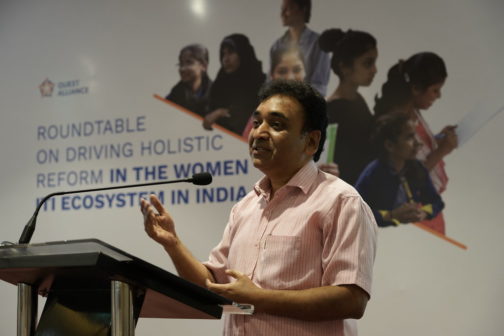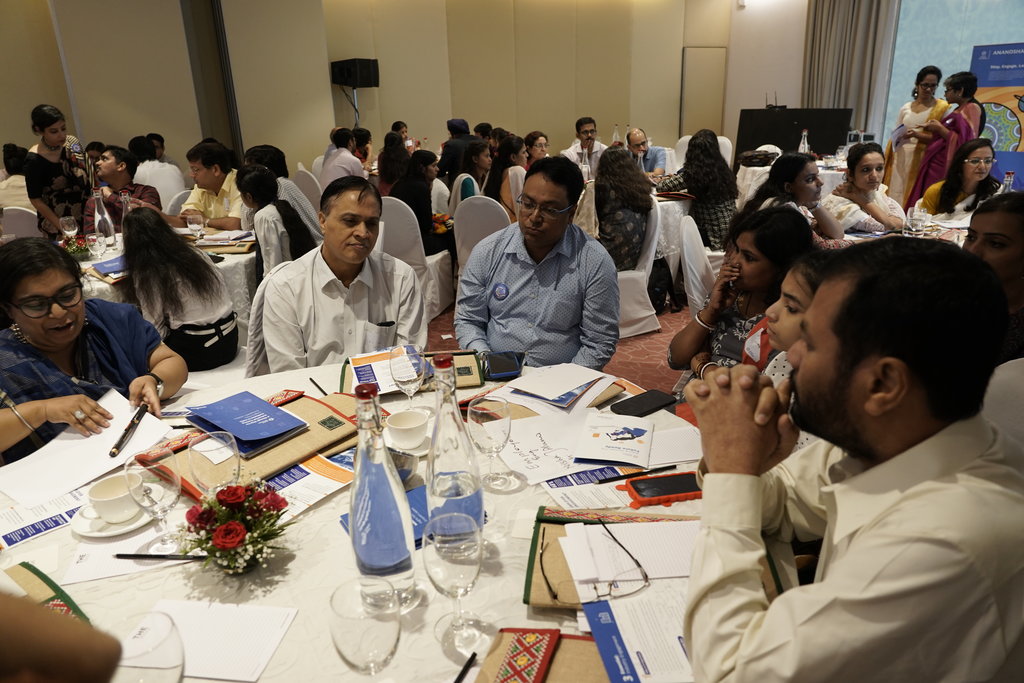As a major step towards strengthening its strategy towards bringing more women to the workforce, Quest Alliance, in partnership with J.P. Morgan hosted a round table on Driving Holistic Reform in the Women ITI Ecosystem in India.
Through a multi-stakeholder consultation, the round table focused on:
- Dissecting challenges faced by young women in accessing good quality work opportunities post training
- Opportunities to equip young women learners in ITIs with 21st century skills for a fast changing world of work
The discussions saw contributions from over 50 key stakeholders from the women ITI ecosystem. These included, Director General of Training, Ministry of Skill Development and Entrepreneurship (MSDE),Department of Employment and Training (DET) officials, National Skill Development Corporation (NSDC),National Institute of Entrepreneurship and Small Business Development (NIESBUD),Sector Skills Councils, Alumni from Govt. Women it is,NGOs working on skill development, with women, Principals from Govt. Women ITIs, Delhi and CSRs.
 As part of the round table’s opening, Mr. Rajesh Aggarwal, Director General of Training, MSDE highlighted the importance of employability skills and effective industry partnerships in women ITIs.
As part of the round table’s opening, Mr. Rajesh Aggarwal, Director General of Training, MSDE highlighted the importance of employability skills and effective industry partnerships in women ITIs.
He further emphasized on foundational changes that can enhance women ITIs’ contribution towards reducing the gender gap in India’s workforce.
“Women make up only 13%-14% of the total admissions in an ITI. The DGT plans to add new norms that call out an increased focus on safety and basic infrastructure like toilets to encourage more women to enrol in ITIs.”
This was followed by Jennie Sparandara, Head of Workforce Initiatives, Global Philanthropy at JP Morgan emphasizing on the need to talk about the challenges women face when it comes to both – entering and staying in the workforce.
“There is a real need to talk about the urgency of this issue. We need more industry partnerships and sharings around innovative learnings amongst all of us working to bring more women to the workforce.”
 Following this, Quest Alliance presented its six-point reform agenda for women ITIs. As a change map, these reform areas are driven by the need for a holistic change in the ecosystem. With Quest’s research and learnings around major challenges and barriers as context, the participants broke into six groups. Each group focused on the following three areas from Quest’s six-point change map for ITIs:
Following this, Quest Alliance presented its six-point reform agenda for women ITIs. As a change map, these reform areas are driven by the need for a holistic change in the ecosystem. With Quest’s research and learnings around major challenges and barriers as context, the participants broke into six groups. Each group focused on the following three areas from Quest’s six-point change map for ITIs:
- Career Development
- Industry Engagement and;
- Parent Engagement
The multi-stakeholder participation on each table led to several important solution strategies. Each group presented their recommendations to the larger group.
Alumni present on every table, shared their feedback around admission and training in ITIs. “We weren’t provided any orientation during our admission. This is a major gap. An orientation can help students understand what to expect from the ITI and their trade. Also, while it is mandatory for students to have 80 percent attendance in ITIs, why are trainers exempt from any such requirements? My trainer was never around for close to six months of the course,” Alumni, Govt. Women ITI.
Among other things, a greater thrust to dual system of training to ensure women ITI students’ exposure to industry and flexi-MoUs were discussed as some important models for increasing placement rates. Other solutions discussed included employer sensitization, rigorous and regular parent engagement sessions and leadership development programs for principals.
Quest Alliance, with inputs and insights generated at the round table will work to consolidate them into a ‘Charter of Recommendations’ for the women ITI ecosystem in India which will be shared shortly. The charter will be based on a vision for holistic reform, that engages all stakeholders through actionable and bottom-up change in women ITIs.












